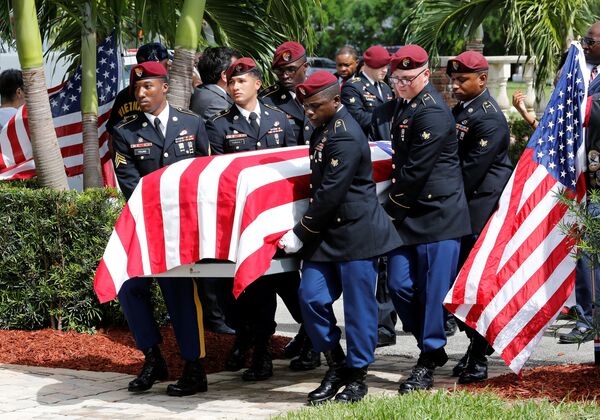Sergeant Logan J. Melgar, a 34-year-old veteran, who had served two tours of Afghanistan, was found dead on June 4 in the embassy housing he shared in the Malian capital, Bamako, with other Special Operations forces assigned to the West African nation to train local forces and conduct counterterrorism missions.
Now, the US Naval Criminal Investigative Service (NCIS) is investigating whether two members of elite SEAL Team 6 strangled him.
On June 4, Army Staff Sgt. Logan J. Melgar was found dead in his room in embassy housing in Bamako, Mali. Homocide? #Hispanic. pic.twitter.com/mwFKGKu1k6
— phyllis young murray (@cybrarian75x) October 30, 2017
Melgar's superiors in Stuttgart, Germany, almost immediately suspected foul play, and dispatched an investigating officer to the scene within 24 hours, military officials said. Agents from the Army's Criminal Investigation Command arrived soon after and spent months on the case before handing it off last month to the NCIS.
No Charges, Number of Possible Motives
No one has been charged in Melgar's death, which a military medical examiner ruled to be "homicide by asphyxiation" (strangulation).
The two SEAL suspects have not been identified. They were flown out of Mali shortly after the episode and placed on administrative leave.
Neither the army nor the military's Africa Command issued a statement about Melgar's death, not even after investigators changed their description of the two SEALs from "witnesses" to "persons of interest" — meaning authorities were trying to determine what the commandos knew about the death, and if they were involved.
The uncertainty has left soldiers in the tight-knit Green Beret community to speculate wildly about any number of possible motives — from whether it was a personal dispute among housemates gone horribly wrong, to Melgar stumbling upon illicit activity the SEALs were involved in, leading them to silence him.
Devoted Father of Two Sons
Melgar, a graduate of Texas Tech University who joined the Army in 2012, was assigned to the Third Special Forces Group, based at Fort Bragg, North Carolina — the same unit whose soldiers were attacked by a much larger and heavily armed group of Daesh fighters near the border between Niger and Mali, October 4.
He was in the fourth month of a six-month deployment there.
Melgar was part of a small team in Bamako assigned to help provide intelligence about Islamic militancies in Mali to the US ambassador there, Paul A. Folmsbee, to protect US personnel against attacks.
The sergeant also helped assess which Malian army troops might be trained and equipped to build a counterterrorism force. He is described by military spokespeople as a devoted father of two sons, 13 and 15, who texted and talked via Skype multiple times a day with his wife while serving overseas.
String of Mystery Murders in Africa
The Navy SEALs' potential involvement in the killing raises the chilling prospect of a US soldier being murdered by their fellow troops, and threatens to stain the reputation of SEAL Team 6, the much-venerated counter-terrorism unit that carried out the infamous raid that killed Osama bin Laden in 2011.
Sr counterterrorism official: US believes ISIS in the Greater Sahara- led by Adnan Abu Walid al-Sahraoui- conducted Oct 4 attack in #Niger pic.twitter.com/e7sO2JOpoG
— margaret brennan (@margbrennan) October 26, 2017
However, Melgar's murder is but the latest violent death under mysterious circumstances for US troops on rarely acknowledged missions in Africa.
Four US soldiers were killed earlier in October in neighboring Niger, while conducting what was initially described as a reconnaissance patrol, but was later admitted to be an active combat mission targeting militants in the area.

Unexplained deaths at military installations are a phenomenon, not isolated to the US. In the UK, there were four deaths at Deepcut army barracks between 1995 — 2002.
Each individual was a trainee in Phase 2 of military training, and were found dead with gunshot wounds they could or would likely not have inflicted themselves. Nonetheless, in each case the Coroner's verdict — reached following investigation by the Royal Military Police — was one of suicide.
Yesterday's ruling means Sean Benton's family can finally uncover the toxic culture he lived in at #Deepcut barracks https://t.co/qCPS3cACvH pic.twitter.com/1gZdwvEY56
— Martha Spurrier (@marthaspurrier) September 21, 2017
In March 2015, the family of one of the victims, Private Geoff Gray, demanded a fresh inquest after receiving 16,000 pages of new evidence from Surrey Police. At the original inquest, which lasted just four hours, only 20 pages of evidence were presented.
That same year, the army's legal team admitted it had only handed over 75 percent of the material it held on the death of another Private, Cheryl James, at the barracks. James' death was considered particularly suspicious, there was no evidence to connect the weapon found alongside her body with her death — no fingerprints were collected from the rifle, ammunition from it was inexplicably destroyed, and the clothing Cheryl was wearing was never examined forensically.


